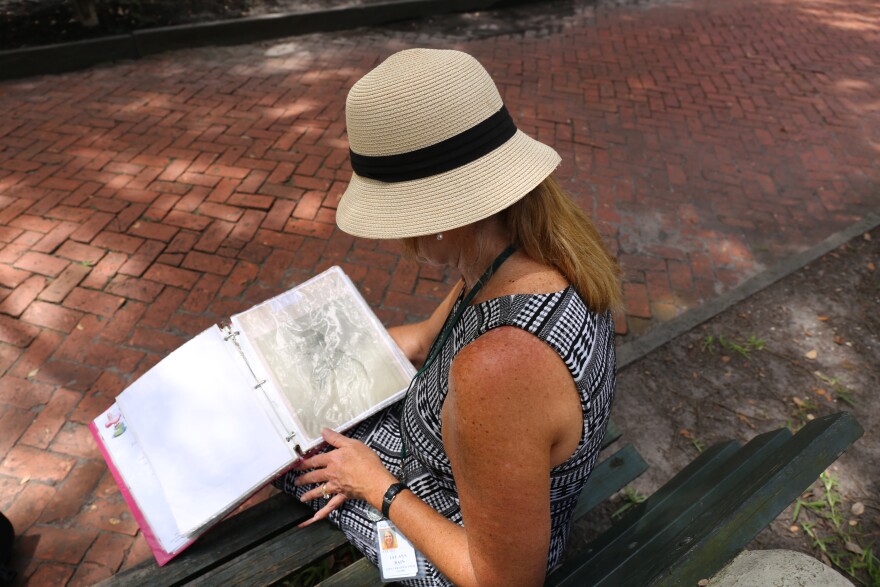
Lee Ann Bain talks excitedly as she darts from the sun to the shade along Charleston's sweltering city streets. There's hardly a bead of sweat forming on her face. Bain knows how to beat the heat. She's been giving walking tours for 11 years.
Bain remembers studying to become a certified guide. There was just a small paragraph about the Grimke sisters. But it catapulted from the page.
"I was like, excuse me who are these ladies?" Bain says. "I've never ever heard of them before."

So, Bain researched and read, and what she found was fascinating. The Grimke sisters, Sarah and Angelina, grew up in Charleston during the early 1800s in a wealthy planter family whose fortune was built on the backs of slaves. They went on to become the first female abolitionists and advocates for women's rights.
Bain created a tour about the sisters six years ago.
She pays a visit to the Heyward Washington House on Church Street. Built in 1772, it was once home to Thomas Heyward, Jr., a signer of the United States Declaration of Independence. It's also where George Washington stayed when he visited Charleston in 1791.
But, that's not all.
"It really should say the Heyward Washington Grimke house because this is one of the Grimke houses," says Bain.
She explains older sister Sarah spent much of her childhood here. Her third -floor bedroom overlooked the backyard. It's where Sarah was first exposed to the horrors of slavery.
"When she's about 5 or 6 years-old, she sees a slave being whipped in her own backyard," Bain explains. "It upsets her so much she runs out the front door. They find her at the wharf a couple of hours later begging the ship's captain, 'Take me away. Take me away. Take me away.'"

Much younger sister Angelina also witnessed the cruelty of slavery when a young boy returned to her finishing school severely beaten. He had been sent to the city's Work House on Magazine Street. It was a torture chamber of sorts, where masters sent slaves who disobeyed.
"For 25 cents you would send your slave to the whipping room," says Bain. "The whipping room had sand on the floor and walls were hollow and they poured sand in those walls to help muffle the screams."
As the Grimke family grew, they moved to make room their 14 children. The new home was on East Bay Street not far from Gadsden's Wharf. That's where enslaved Africans were brought to the city and unloaded like cattle, including a young girl given to Sarah.

But Sarah decided to teach the slave how to read instead of putting her to work. A fictional account of their relationship became a best seller in author Sue Monk Kidd's novel, "The Invention of Wings".
Fed up with the South and its love of slavery, Sarah later headed to Philadelphia. Angelina followed.
"Both sisters will walk away from Charleston being unmarried and that was completely unheard of," says Blain.
The Grimke sisters left everything they had ever known as they sought equal rights for African Americans.
They spoke publicly as abolitionists, but were ridiculed for doing so. Public speaking at that time was not for women. The sisters saw a connection between their plight and slavery.
"What can women do for the slave when she herself is under the feet of man and shamed into silence," wonders Angelina.
The Grimke sisters wanted equal rights for all people, regardless of skin color or gender. They continued to speak their minds, and wrote pamphets and letters trying to persuade people.
The sisters were ahead of their time.
"What can women do for the slave when she herself is under the feet of man and shamed into silence"- Angelina Grimke
Angelina became the first woman to address a legislative body, declaring a woman had as much a right to be president as a man.
Sarah's words have been quoted more than 100 years later by now U.S. Supreme Court Justice Ruth Bader Ginsburg.
"I ask no favors for my sex. All I ask dear brethren is they will take their feet from off our necks and permit us to stand up right on the ground God has designated us to occupy."
The Grimke sisters died before the turn of the century. They did not get to see the passage of the 19th amendment giving women the right to vote.
But they dreamed of it, after living the nightmare of slavery in a city they once called home.
To celebrate the 100th anniversary of the passage of the 19th Amendment, which gave women the right to vote, South Carolina Public Radio and South Carolina ETV are broadcasting the series Sisterhood: South Carolina Suffragists. The series looks at how local women played roles in a national movement that eventually guaranteed more than 26 million women the right to vote.


